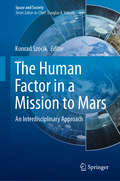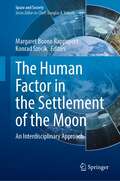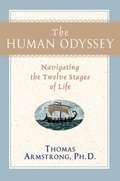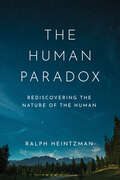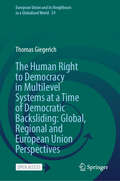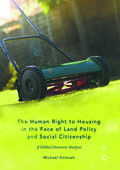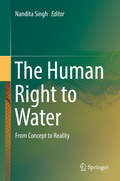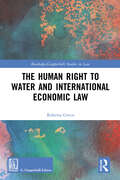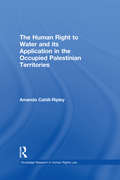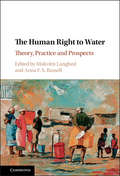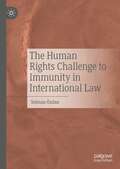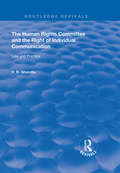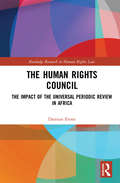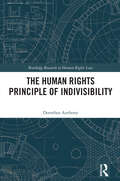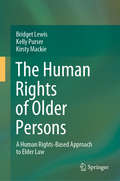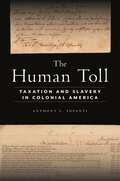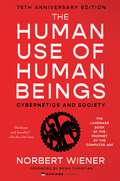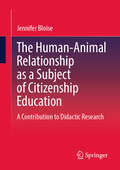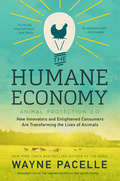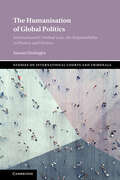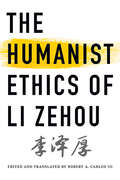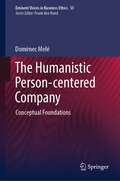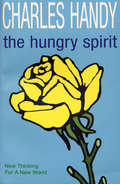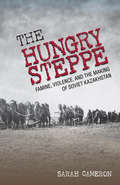- Table View
- List View
The Human Factor in a Mission to Mars: An Interdisciplinary Approach (Space and Society)
by Konrad SzocikA manned mission to Mars is faced with challenges and topics that may not be obvious but of great importance and challenging for such a mission. This is the first book that collects contributions from scholars in various fields, from astronomy and medicine, to theology and philosophy, addressing such topics. The discussion goes beyond medical and technological challenges of such a deep-space mission. The focus is on human nature, human emotions and biases in such a new environment.The primary audience for this book are all researchers interested in the human factor in a space mission including philosophers, social scientists, astronomers, and others. This volume will also be of high interest for a much wider audience like the non-academic world, or for students.
The Human Factor in the Settlement of the Moon: An Interdisciplinary Approach (Space and Society)
by Konrad Szocik Margaret Boone RappaportApproaching the settlement of our Moon from a practical perspective, this book is well suited for space program planners. It addresses a variety of human factor topics involved in colonizing Earth's Moon, including: history, philosophy, science, engineering, agriculture, medicine, politics & policy, sociology, and anthropology. Each chapter identifies the complex, interdisciplinary issues of the human factor that arise in the early phases of settlement on the Moon. Besides practical issues, there is some emphasis placed on preserving, protecting, and experiencing the lunar environment across a broad range of occupations, from scientists to soldiers and engineers to construction workers. The book identifies utilitarian and visionary factors that shape human lives on the Moon. It offers recommendations for program planners in the government and commercial sectors and serves as a helpful resource for academic researchers. Together, the coauthors ask and attempt to answer: “How will lunar society be different?”
The Human Odyssey: Navigating the Twelve Stages of Life
by Thomas ArmstrongTravel through the first stirrings of life in the womb to the anticipation of death and even beyond. In a unique synthesis, Thomas Armstrong draws on a wide range of sources from various disciplines and cultures to fashion a compelling narrative. The core of this enlightening guide consists of 12 chapters, each describing a different period of life, with its own unique changes, struggles, and growth. A final chapter poses the possibility that the voyage may even continue after physical death.
The Human Paradox: Rediscovering the Nature of the Human
by Ralph HeintzmanWhat is a human being? What does it mean to be human? How can you lead your life in ways that best fulfil your own nature? In The Human Paradox, Ralph Heintzman explores these vital questions and offers an exciting new vision of the nature of the human. The Human Paradox aims to counter or correct several contemporary assumptions about the nature of the human, especially the tendency of Western culture, since the seventeenth century, to identify the human with rationality and the rational mind. Using the lens of the virtues, The Human Paradox shows how rediscovering the nature of the human can help not just to understand one’s own paradoxical nature but to act in ways that are more consistent with its full reality. Offering accessible insight from both traditional and contemporary thought, The Human Paradox shows how a fuller, richer vision of the human can help address urgent contemporary problems, including the challenges of cultural and religious diversity, human migration and human rights, the role of the market, artificial intelligence, the future of democracy, and global climate change. This fresh perspective on the Western past will guide readers into what it means to be human and open new possibilities for the future.
The Human Right to Democracy in Multilevel Systems at a Time of Democratic Backsliding: Global, Regional and European Union Perspectives (European Union and its Neighbours in a Globalized World #24)
by Thomas GiegerichThis open access book takes stock of the current situation of the human right to democracy in multilevel systems of government - at a time of renewed struggles with antidemocratic forces (democratic backsliding). It tries to answer three questions: (1) Is there a human right to democracy in contemporary global and regional international law as well as European Union law and what consequences does that have for the States&’ governmental structure (top-down perspective on national democracy)? (2) Does the human right to democracy also extend to decision-making at the international and supranational level (bottom-up perspective on international/supranational democracy)? (3) What is the relation between national democracy and international democracy and the corresponding human entitlements (interdependence perspective)? The first part of an answer to these questions derives from the elements of democracy proclaimed by the United Nations as a universal value. The second part results from an investigation of the national and international democratic ingredients of the right of self-determination of peoples, whose recognition and codification is the mainstay of the human rights revolution since 1945. The third part is added by a survey and comparison of the various democratic rights included in the global and regional human rights treaties that constitute the subjective cornerstones of democracy. The fourth part is devoted to analysing the EU as exemplary but imperfect multilevel democracy. In all these parts, the enforcement of democratic entitlements are also discussed. In the fifth part, conclusions will be drawn. The book is addressed to international and EU law experts as well as political scientists.
The Human Right to Housing in the Face of Land Policy and Social Citizenship
by Michael KolocekThis book explores the human right to housing, presenting the findings of a global discourse analysis to analyse the right to housing from the perspective of theories on land policy and social citizenship. The book concludes that planners and policy makers will not be able to completely fulfil the human right to housing. For that reason, the book presents a theory of de-commodification of land use that highlights the meaning of land use rights for people affected by inadequate housing. Students and scholars across a range of disciplines, including social policy, global social policy, human rights law, discourse theory, and sociology will find this study of interest.
The Human Right to Water
by Nandita SinghThe discourse on the human right to water presents deliberations on the concept, content and rationale for the right, with little attention to the practical question of translating the right into reality. This book aims to fill this void by focusing on 'realization' of the right by its holders, examining how effective the mechanisms are for 'implementing' the right in enabling its universal realization. In a quest to answer this question, the book draws a conceptual differentiation between 'implementation' and 'realization' of the right, arguing that unlike implementation - which is an objective process of creation and implementation of measures such as legal frameworks, institutional structures or policy and action guidelines, realization of the right is a subjective process that extends much beyond. It takes shape within specific contextual settings which may include varied situations, yet remains neglected in the related academic and action forums. This book attempts to address this void by discussing some of the most significant contexts and the underlying problems and concerns that strongly influence realization of the human right to water. It contends that if the right is to be truly realized, these different contexts - which can be further classified as 'objective' and 'subjective' - must be understood, analysed and appropriately addressed before framing and implementing relevant action. The book further situates the human right to water discourse in a broader interdisciplinary perspective, expanding its scope beyond the narrower legal dimensions, linking it to the wider field of water resources management/governance. Through the novel ideas it proposes, the book makes an innovative and unique contribution in the field of human right to water which is of great scientific value.
The Human Right to Water and International Economic Law (Routledge-Giappichelli Studies in Law)
by Roberta GrecoThis book discusses the international right to water and the liberalization of water services. It is concerned with the harmonization of the right to water with the legal systems under which liberalization of water services has taken or may take place. It assesses paths of harmonization between international human rights law and international economic law in this specific field. The issue of the compatibility between the fulfilment of the right to water and the liberalization of water services has been at the heart of a passionate public debate between opponents and advocates of the privatization of the utility. The book provides an unbiased analysis of different international legal regimes under which the liberalization of water services has occurred or is likely to occur, notably international investment law, international trade law and European Union law, in order to assess whether the main features of the right to water can be guaranteed under each of these systems of law and whether there is space for prospective harmonization. The work will be an invaluable resource for academics, researchers and policy-makers working in the areas of International Human Rights Law, International Economic Law, International Water Law, International Trade Law and EU Law.
The Human Right to Water and its Application in the Occupied Palestinian Territories (Routledge Research in Human Rights Law)
by Amanda Cahill RipleyThe Human Right to Water and Its Application in the Occupied Palestinian Territories provides an overview and examination of the human right to water as determined under international human rights law. This is a highly topical issue, with the UN General Assembly having passed a resolution which declares access to clean water and sanitation a human right (New York, Jul 28 2010), the recent appointment of the UN Independent Expert on the issue of human rights obligations related to access to safe drinking water and sanitation, and movement within the NGO community for an international water treaty. Amanda Cahill Ripley analyses the current legal status, substantive content, and obligations correlative to the right, and examines the relationship between other economic, social and cultural rights related to the right to water. The book goes on to look more specifically at the application of the human right to water in the Occupied Palestinian Territories. Using innovative methodology, Cahill Ripley combines legal analysis with a qualitative social science empirical case study to explore the enjoyment of the right ‘on the ground’. The wider implications of the case study findings are then considered, looking at what can be done to strengthen the right legally in terms of its status and codification, and what remedy can be found for violations of the right, both specifically in the Occupied Palestinian Territories and in a more general context. The book will be of interest to students, academics and practitioners within the fields of international human rights law and international humanitarian law, as well as those concerned with international relations and conflict resolution within Israel/Palestine and the wider Middle East region.
The Human Right to Water: Theory, Practice and Prospects
by Russell Malcolm Langford Anna F. S.In a short space of time, the right to water has emerged from relative obscurity to claim a prominent place in human rights theory and practice. This book explores this rise descriptively and prescriptively. It analyses the recognition, use and partly impact, of the right to water in international and comparative law, civil society mobilisation and public policy. It also scrutinises the normative implications of the right to water with a focus on challenges and puzzles it creates for law and policymaking. These questions are explored globally and comparatively within different dynamics of the sector - water allocation, water access and urban and rural water reform - and in conjunction with the right to sanitation. This multi-disciplinary volume reveals the diverse ways in which the right to water has been adopted, but also its limitations when faced with the realities of political economy, political ecology and partly, traditional legal thought.
The Human Rights Challenge to Immunity in International Law
by Selman ÖzdanThis book focuses on the tension between the protection of human rights recognised as jus cogens (peremptory) norms, on the one hand, and the bestowal of immunity on the state and its representatives, on the other, to ascertain how these immunities can be eroded, if not fully abolished, to maintain full protection of jus cogens human rights under international law. The book argues that immunity should not equate to impunity when violations of jus cogens human rights are committed by States, Heads of State, or diplomatic agents. To make the case, the organic structures of the concepts of sovereignty and fundamental human rights are examined. Then, the human rights-based challenge to immunity is presented with respect to State, Head of State and diplomatic immunity, and the transition from a state-centric system to a human-centric system is explored. Jus cogens norms are at the centre of the impunity versus immunity debate.
The Human Rights Committee and the Right of Individual Communication: Law and Practice (Routledge Revivals)
by P. R. GhandhiThis book was originally published in 1998. Protection of Human Rights both at a regional and at an international level is now a major pre-occupation of International Law. The International Covenant on Civil and Political Rights 1966 is probably the most important single universal human rights instrument of our time, which both sets standards and ensures compliance with them, through measures of implementation. More than 135 States have accepted the obligations imposed by this Covenant. This book provides a comprehensive analysis of the provisions of the Optional Protocol, which enshrines the right of individual communication and the jurisprudence developed thereunder by the Human Rights Committee, which is the supervisory body of this treaty regime. It analyses the effectiveness of the committee in protecting the rights of individuals under the Optional Protocol. The book will be of particular interest to scholars engaged in the teaching of and research in the international protection of human rights. It will appeal to undergraduate and postgraduate law students. Practitioners in the international human rights field will also find it valuable. It should be of interest to international N.G.O.s and governmental officials engaged upon ensuring effective compliance with our international rights obligations.
The Human Rights Council: The Impact of the Universal Periodic Review in Africa (Routledge Research in Human Rights Law)
by Damian EtoneThis book examines the engagement of African states with the United Nations Human Rights Council’s Universal Periodic Review (UPR) mechanism. This human rights mechanism is known for its pacific and non-confrontational approach to monitoring state human rights implementation. Coming at the end of the first three cycles of the UPR, the work offers a detailed analysis of the effectiveness of African states’ engagement and its potential impact. It develops a framework which comprehensively evaluates aspects of states’ UPR engagement, such as the pre-review national consultation process and implementation of UPR recommendations which, until recently, have received little attention. The book considers the potential for acculturation in engagement with the UPR and unpacks the impact of politics, regionalism, cultural relativism, rights ritualism and civil society. The work provides a useful guide for policymakers and international human rights law practitioners, as well as a valuable resource for international legal and international relations academics and researchers.
The Human Rights Principle of Indivisibility (Routledge Research in Human Rights Law)
by Dorothea AnthonyThe indivisibility principle holds that all human rights are equally important and should be respected in equal measure. This book provides a comprehensive explanation and analysis of indivisibility — its meaning(s), history, ideological significance, benefits, and shortfalls. In this way, the work brings indivisibility into the realm of critical thought that the principle of universality, for example, has long occupied. The work examines representations of indivisibility across multiple legal and academic sources from the last several decades in which interest in indivisibility and human rights has grown exponentially. It lucidly details how indivisibility has been used to legitimise the human rights project and fortify associated social campaigns. It illustrates the human rights community’s sincere enthusiasm for indivisibility. But it also questions the politics behind the renewed promotion of indivisibility and its declared goals. The book is structured according to these goals or social functions that indivisibility has come to take on since it was popularised at the World Conference on Human Rights. In addressing the functions of indivisibility, the book uncovers fascinating dynamics underpinning the principle and mainstream human rights theory in general. It reveals a paradox in which contemporary indivisibility both challenges and supports the traditional human rights catalogue and the social system out of which the principle arose. It asks whether persisting social contradictions and divided interests in the post-Cold War world might weaken the moral claims to a new undividedness of rights and lead to the conclusion that we should be more realistic about how human rights law and policy have evolved and what they have to offer. The book will be of interest to academics, researchers, and policy-makers working in the areas of human rights studies, international law, political science, and the humanities.
The Human Rights of Older Persons: A Human Rights-Based Approach to Elder Law
by Kelly Purser Bridget Lewis Kirsty MackieThis book provides a comprehensive human rights analysis of key areas of law affecting older persons, including legal capacity; elder abuse; accommodation and aged care; healthcare; employment; financial security, retirement, and estate planning; and social and cultural participation. The research identifies individual autonomy and participation in decision-making as fundamental to a human rights-based approach to elder law. The book argues that a paradigm shift must occur away from traditional medical and charity-based understandings of ‘old age’ to instead acknowledge older persons as active holders of enforceable rights. The book argues that a Convention on the Rights of Older Persons is an essential tool in achieving this, but that even without a dedicated treaty there is much to be gained from a human rights-based approach. Significantly, because the issues arising in ‘old age’ are often the culmination of experiences occurring throughout the life course, a human rights-based approach to elder law must begin with a commitment to human rights for people of all ages.
The Human Rights-Based Approach to Carbon Finance
by Damilola S. OlawuyiThis book analyses the topical and contentious issue of the human rights impacts associated with carbon projects, especially in developing countries. It outlines a human rights-based approach to carbon finance as a functional framework for mainstreaming human rights into the design, approval, finance and implementation of carbon projects. It also describes the nature and scope of carbon projects, the available legal options for their financing and the key human rights issues at stake in their planning and execution. Written in a user-friendly style, the proposal for a rights-based due diligence framework through which human rights issues can be anticipated and addressed makes this book relevant to all stakeholders in carbon, energy, and environmental investments and projects.
The Human Toll: Taxation and Slavery in Colonial America
by Anthony C. InfantiHow the thirteen colonies deployed the power of taxation to support, promote, and perpetuate the institution of slaveryThe Human Toll documents how the American colonies used tax law to dehumanize enslaved persons, taxing them alongside valuable commodities upon their forced arrival and then as wealth-generating assets in the hands of slaveholders. Anthony C. Infanti examines how taxation also proved to be an important component for subjugating and controlling enslaved persons, both through its shaping of the composition of new arrivals to the colonies and through its funding of financial compensation to slaveholders for the destruction of their “property” to ensure their cooperation in the administration of capital punishment. The variety of tax mechanisms chosen to fund slaveholder compensation payments conveyed messages about who was thought to benefit from—and, therefore, who should shoulder the burden of—slaveholder compensation while opening a revealing window into these colonial societies.While the story of colonial tax law is intrinsically linked to advancing slavery and racism, Infanti reveals how several colonies used the power of taxation as a means of curtailing the slave trade. Though often self-interested, these efforts show how taxation can be used not only in the service of evil but also to correct societal injustices. Providing a fascinating account of slavery’s economic entrenchment through the history of American tax law, The Human Toll urges us to consider the lessons that fiscal history holds for those working in the reparations movement today.
The Human Use of Human Beings: Cybernetics and Society
by Norbert WienerFor the 75th anniversary, a new edition of The Human Use of Human Beings—the landmark book that delves into the relationship between humans and computers, and presciently anticipates many contemporary dilemmas surrounding AI technology. With a new introduction by Brian Christian, author of the bestselling Algorithms to Live By and The Alignment Problem.In 1950, mathematician-philosopher Norbert Wiener ended this classic book on the place of machines in society with a warning: “We shall never receive the right answers to our questions unless we ask the right questions.... The hour is very late, and the choice of good and evil knocks at our door.”Wiener, the founder of the science of cybernetics—the study of the relationship between computers and the human nervous system—was widely mislabeled as an advocate for the automation of human life. As The Human Use for Human Beings reveals, his vision was much more complex and interesting, and is more relevant in today’s world of AI than anyone could have anticipated.In his new introduction, Brian Christian aptly calls Wiener the “progenitor of contemporary AI-safety discourse.” Wiener hoped that machines would release people from relentless and repetitive drudgery to achieve more creative pursuits, yet he anticipated the danger of dehumanizing and displacement. His pioneering views on the human-machine relationship as a “communicative process” are only more crucial now, as we carry in our pockets AI devices that we can literally speak to. His prescient warnings illuminate our contemporary relationships with language, art, and even social media.The Human Use of Human Beings examines the implications of cybernetics for education, law, language, science, technology, as Wiener anticipates the enormous impact—in effect, a third industrial revolution—that the computer has had on our lives.
The Human-Animal Relationship as a Subject of Citizenship Education: A Contribution to Didactic Research
by Jennifer BloiseThe aim of this book is to explore the human-animal relationship as a new subject of political education and to make it accessible for critical reflection. A guiding thesis is that society&’s relationship with animals is both political and problematic, as it is shaped by power structures and rarely recognized as an issue due to its status as an unexamined norm. To explore this topic, the model of didactic reconstruction is employed. A problem-centered interview study is used to reconstruct students&’ everyday conceptions of animals, humans, and their (political) relationship. These conceptions are then compared with academic perspectives—particularly from Human-Animal Studies—in order to uncover contradictions and taken-for-granted assumptions, and to identify exemplary, didactically fruitful approaches to the subject. The author concludes that future engagement with the human-animal relationship in the context of political education should be critically oriented toward power structures. This would enable reflective and multi-perspective political judgment on the human-animal relationship—making the invisible visible.
The Humane Economy: How Innovators and Enlightened Consumers Are Transforming the Lives of Animals
by Wayne PacelleA major new exploration of the economics of animal exploitation and a practical roadmap for how we can use the marketplace to promote the welfare of all living creatures, from the renowned animal-rights advocate Wayne Pacelle, President/CEO of the Humane Society of the United States and New York Times bestselling author of The Bond.In the mid-nineteenth century, New Bedford, Massachusetts was the whaling capital of the world. A half-gallon of sperm oil cost approximately $1,400 in today's dollars, and whale populations were hunted to near extinction for profit. But with the advent of fossil fuels, the whaling industry collapsed, and today, the area around New Bedford is instead known as one of the best places in the world for whale watching.This transformation is emblematic of a new sort of economic revolution, one that has the power to transform the future of animal welfare. In The Humane Economy, Wayne Pacelle, President/CEO of the Humane Society of the United States, explores how our everyday economic decisions impact the survival and wellbeing of animals, and how we can make choices that better support them. Though most of us have never harpooned a sea creature, clubbed a seal, or killed an animal for profit, we are all part of an interconnected web that has a tremendous impact on animal welfare, and the decisions we make--whether supporting local, not industrial, farming; adopting a rescue dog or a shelter animal instead of one from a "puppy mill"; avoiding products that compromise the habitat of wild species; or even seeing Cirque du Soleil instead of Ringling Brothers--do matter. The Humane Economy shows us how what we do everyday as consumers can benefit animals, the environment, and human society, and why these decisions can make economic sense as well.
The Humanisation of Global Politics: International Criminal Law, the Responsibility to Protect, and Drones (Studies on International Courts and Tribunals)
by Sassan GholiaghaThis book observes a growing humanisation of global politics relating to the appearance of individual human beings in discourses of global politics. It identifies a mismatch concerning International Relations theory and International Law and the study of the humanisation of global politics. To overcome this mismatch, Sassan Gholiagha proposes a novel theoretical framework based on feminist and constructivist International Relations theory and non-statist theories of International Law scholarship. The book applies this interdisciplinary framework together with an interpretative analytical framework to three cases: the discourse on prosecution, studying international criminal law and the work of the International Criminal Court; the discourse on protection, focusing on the Responsibility to Protect; and the use of drones in targeted killing operations. Drawing on these case studies and the frameworks, the book identifies how individual human beings as participants in global politics position themselves and are positioned by others in these various discourses.
The Humanist Ethics of Li Zehou (SUNY series, Translating China)
by Zehou LiLi Zehou's thought has achieved wide popularity and influence among both academic readers and the broader Chinese-reading public. His culminating views on ethics are collected here in a series of essays that highlight the importance of Confucian philosophy today. Li's groundbreaking ethics presents a powerful contemporary theory—one that inventively reconciles longstanding oppositions between relativism and absolutism, emotions and rationalism, and relationality and individuality. Seeing ethical values and principles as embedded in human psychology, society, and history, Li affirms their relativity; he also affirms the objective rightness and wrongness of beliefs, norms, and acts through their contribution to human progress and flourishing. Li thereby endorses modern Enlightenment liberal values, including individualism, rights, and freedoms, but from an original philosophical foundation. By drawing on classical Confucianism to prioritize the situated, relational, emotional constitution of human life, this concrete brand of humanism offers unique modern conceptions of the nature of reason, the source of morality, selfhood, virtue, and much more.
The Humanistic Person-centered Company (Issues in Business Ethics #55)
by Domènec MeléHumanism in business is not only an alternative to economism but a way to human excellence. Humanism presented here revolves around the rich notion of “human person”, keystone of modern personalist philosophy and Catholic Social Teaching. From this perspective this book is offered to everyone, believer and nonbeliever alike. The person-centered humanism considers the human-wholeness, individual and relational, with subjectivity, self-determination, openness to transcendence, and with capacity not only to possess but also to give. It also highlights the uniqueness of each person, endowed with a high constitutive dignity and in continuous process of flourishing toward human plenitude. An attitude of respect and good will is due to non-personal beings, while persons deserve to be treated with justice and even with love of benevolence. The book is prepared in dialogue with mainstream of thought in business and business ethics and focused on exploring ways to improve some conventional views. It includes some proposals such as a person-based ethics, ethics understood as intrinsic to business activity, the consideration of the company as an organized community of persons, and the purpose of the company oriented toward the common good through a double mission, internal and external. It is also suggested substituting the notion of “stakeholder” for the richer one of “relationholder.”
The Hungry Spirit: New Thinking for a New World
by Charles HandyWith his characteristically very personal anecdotal style, Charles Handy analyses how materialistic capitalism is self-limiting, how efficiency may be the enemy of a cohesive society, and examines the false certainties of science and religion. Offering a carefully considered and compelling alternative vision, the book challenges the status quo on everything from capitalism and organization to goal-setting and morality. With nods to Kant, Keynes, Sartre and Drucker, The Hungry Spirit is not your usual business tome, but that, of course, is part of Handy's plan.
The Hungry Steppe: Famine, Violence, and the Making of Soviet Kazakhstan
by Sarah CameronThe Hungry Steppe examines one of the most heinous crimes of the Stalinist regime, the Kazakh famine of 1930–33. More than 1.5 million people perished in this famine, a quarter of Kazakhstan’s population, and the crisis transformed a territory the size of continental Europe. Yet the story of this famine has remained mostly hidden from view. Drawing upon state and Communist party documents, as well as oral history and memoir accounts in Russian and in Kazakh, Sarah Cameron reveals this brutal story and its devastating consequences for Kazakh societyThrough the most violent of means the Kazakh famine created Soviet Kazakhstan, a stable territory with clearly delineated boundaries that was an integral part of the Soviet economic system; and it forged a new Kazakh national identity. But this state-driven modernization project was uneven. Ultimately, Cameron finds, neither Kazakhstan nor Kazakhs themselves were integrated into the Soviet system in precisely the ways that Moscow had originally hoped. The experience of the famine scarred the republic for the remainder of the Soviet era and shaped its transformation into an independent nation in 1991.Cameron uses her history of the Kazakh famine to overturn several assumptions about violence, modernization, and nation-making under Stalin, highlighting, in particular, the creation of a new Kazakh national identity, and how environmental factors shaped Soviet development. Ultimately, The Hungry Steppe depicts the Soviet regime and its disastrous policies in a new and unusual light.
